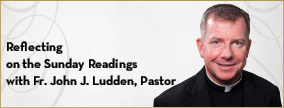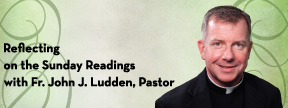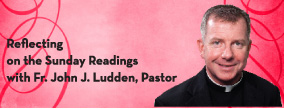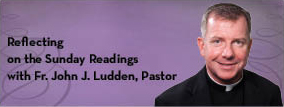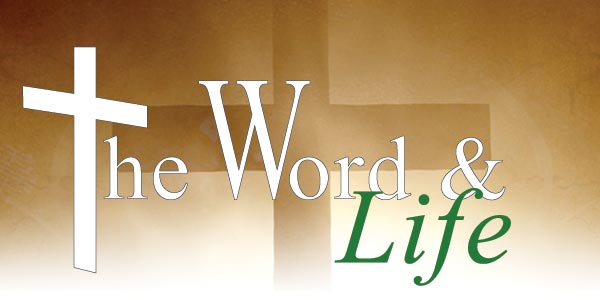
Welcome to the Word & Life Series. In this series, Fr. John Ludden will take the Sacred Scriptures offered at Mass each Sunday and apply them to our everyday lives. As you read Fr. John’s reflection, open your hearts and minds in new ways to God’s Holy Word. St. Paul says “The Word of God is living effective“. So as we journey together in the Word & Life, let us allow the wisdom of God to transform our relationship and our outlook on life, inspiring us to love one another as He has loved us. You are now invited to reflect on the Word of God which is the Way, the Truth, and the Life! Welcome again to the Word & Life!
June 24, 2012
The Nativity of Saint John the Baptist: Year B
Vigil Mass
Jeremiah 1:4-10
Psalm 71:1-2, 3-4a, 5-6ab, 15ab and 17
1 Peter 1:8-12
Luke 1:5-17
The Solemnity
Isaiah 49:1-6
Psalm 139:1b-3, 13-14 ab, 14c-15
Acts 13:22-26
Luke 1:57-66, 80
The Last Prophet – Called to Redundancy
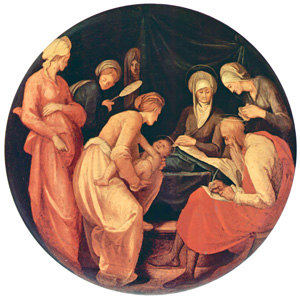 If someone were to ask you to take a job with the intention to eventually eliminate that particular position, you would probably laugh in that person’s face. Moreover, if someone were asked to dedicate their whole life to such a venture, you would probably be insulted at the thought. This is what John the Baptist was called to do as he prepared the way for Christ. Today we celebrate the Nativity of John the Baptist as a Solemnity of the Church. His life is important in the plan of salvation. John is the last of the Hebrew prophets – his whole life ultimately becomes suspended between the prophecies of old and the culmination in the resurrection. John the Baptist gave witness to Christ by preparing the way for the proclamation of the kingdom. John’s baptism was for the repentance of sin in preparation for the coming of the Messiah. When the Baptist sees the Spirit descend upon Jesus, he proclaims him as the “Lamb of God”. John foretells the promised Messiah, and once Jesus is baptized, John’s life-project is complete and his role is diminished. John’s message of repentance continues to be important, but his role in foretelling the Messiah is made redundant because it is realized.
If someone were to ask you to take a job with the intention to eventually eliminate that particular position, you would probably laugh in that person’s face. Moreover, if someone were asked to dedicate their whole life to such a venture, you would probably be insulted at the thought. This is what John the Baptist was called to do as he prepared the way for Christ. Today we celebrate the Nativity of John the Baptist as a Solemnity of the Church. His life is important in the plan of salvation. John is the last of the Hebrew prophets – his whole life ultimately becomes suspended between the prophecies of old and the culmination in the resurrection. John the Baptist gave witness to Christ by preparing the way for the proclamation of the kingdom. John’s baptism was for the repentance of sin in preparation for the coming of the Messiah. When the Baptist sees the Spirit descend upon Jesus, he proclaims him as the “Lamb of God”. John foretells the promised Messiah, and once Jesus is baptized, John’s life-project is complete and his role is diminished. John’s message of repentance continues to be important, but his role in foretelling the Messiah is made redundant because it is realized.
The gospel of Luke sets the scene in the divine drama that surrounds the birth of John the Baptist. John’s father, Zechariah, is a priest in the division of Abijah and part of the religious class. Both Zechariah and Elizabeth were both advanced in years and living without the blessing of children. While Zechariah is performing his religious duties, God breaks into his life by sending a messenger to tell him that his wife will give birth to a child destined to bring the children of Israel to God. Zechariah’s doubt in the divine message strikes him dumb. However, as soon as he takes a tablet to write, breaking from all familial and social tradition, he writes the name given by God’s messenger to dedicate his child’s life to God. Once Zechariah trusts in the Lord’s message, he is restored to wholeness and regains his speech.
Today’s Solemnity and the Scriptures proclaimed, reveal to us the importance of John’s life in the story of our salvation. As God broke through into the life of Zechariah and Elizabeth, we too, are reminded that God breaks into each one of our lives offering the treasure of everlasting life. There may be times when we doubt God’s presence or wisdom in our lives. However, God will remind us just as he did with Zechariah that once we trust in His Word, we will be able to discern His presence through people and the events that unfold in our lives. John the Baptist was set apart to specifically make God’s presence known in the world. John had to discern his purpose through prayer. The Baptist’s response to his prayer and in answering the call was to put his faith into action. Likewise, we too, must discern through prayer what God is calling each one of us to do and put our faith into action. John the Baptist revealed God’s plan through his witnessing to the obligation or repentance and leading a moral life. We are also called to that same position within our own faith life in response to live out our baptismal promises.
Prayer
We pray: Lord, instill within our souls the zeal that allowed John the Baptist to be bold in proclaiming the message of truth. May we trust that you are forever with us, leading and guiding the journey of our lives. John recognized Jesus in the midst of his life and understood his purpose. May we too, understand our purpose and the call given to us by You, our creator. Let each one of us recognize the presence of Jesus along life’s way. Amen.
Reflection Questions
- Why is the significance of Zechariah being struck dumb in the sanctuary?
- How is Zachariah restored to speech?
- Do you see striking similarities in your life?
- How have you doubted God’s plan?
- In what ways have you been restored in your own faith?
- Why is John the Baptist significant in the plan of salvation?
- What impact does John the Baptist’s message have on you?
- What does salvation mean to you personally?
- What does the coming of Christ mean to you?
- Do you allow God’s message and call to change your heart and your decision-making? Why or why not?
- How far will you go in answering the call to conversion and discipleship?
Wisdom of the Fathers
“The Church observes the birth of John as in some way sacred; and you will not find any other of the great men of old whose birth we celebrate officially. We celebrate John’s, as we celebrate Christ’s. This point cannot be passed over in silence, and if I may not perhaps be able to explain it in the way that such an important matter deserves, it is still worth thinking about it a little more deeply and fruitfully than usual….
John is born of an old woman who is barren; Christ is born of a young woman who is a virgin. That John will be born is not believed, and his father is struck dumb; that Christ will be born is believed, and he is conceived by faith…..
John, it seems, has been inserted as a kind of boundary between the two Testaments, the Old and the New. That he is somehow or other a boundary is something that the Lord himself indicates when he says, The Law and the prophets were until John. So he represents the old and heralds the new. Because he represents the old, he is born of an elderly couple; because he represents the new, he is revealed as a prophet in his mother’s womb. You will remember that, before he was born, at Mary’s arrival he leapt in his mother’s womb. Already he had been marked out there, designated before he was born; it was already shown whose forerunner he would be, even before he saw him. These are divine matters and exceed the measure of human frailty. Finally, he is born, he receives a name, and his father’s tongue is loosed…..
Zachary is struck dumb and loses his voice, until John, the Lord’s forerunner, is born and releases his voice for him. What does Zachary’s silence mean, but that prophecy was obscure and, before the proclamation of Christ, somehow concealed and shut up? It is released and opened up by his arrival, it becomes clear when the one who was being prophesied is about to come. The releasing of Zachary’s voice at the birth of John has the same significance as the tearing of the veil of the Temple at the crucifixion of Christ. If John were meant to proclaim himself, he would not be opening Zachary’s mouth. The tongue is released because a voice is being born – for when John was already heralding the Lord, he was asked, “Who are you?” and he replied, “I am the voice of one crying in the wilderness…..”
John is the voice, but the Lord in the beginning was the Word. John is a voice for a time, but Christ is the eternal Word from the beginning.”
~ Saint Augustine of Hippo (Sermon 293, 1-3; PL 38, 1327-1328)
June 17, 2012
Eleventh Sunday in Ordinary Time: Year B
Ezekiel 17:22-24
Psalm 92:2-3, 13-14, 15-16
2 Corinthians 5:6-10
Mark 4:26-34
Planting Seeds – Yielding to the Mystery of Growth
Every time we read Sacred Scripture and digest the Word, we open ourselves to the realm of discernment and belief. All the readings today speak about growth and finding shade it the splendor of the cedar and branches of the mustard bush. The image of the first reading and the two parables contained in the gospel pertain to God’s desire for growth and fruitfulness. In particular, we are asked to relate these images to our personal faith and see where God can work with the barren branches of our life and how we, ourselves, are called to go out and make an effort of scattering the seed on the fertile ground of endless possibilities that God has gifted to us. Even though our efforts or desire to know and serve God more fully may sometimes overwhelm us, we are reminded today that no matter how small our attempts, no matter how small our faith, no matter how long it takes, a time will come when we see the fruits of such labor.
Our lives are so complex. Relationships can be most profound and beautiful, but sometimes fall prey to hardship and pain. When relationships become difficult and people distance themselves from one another, the heart can break and the very faith to which we cling can be tested. Serious illness can either bring us closer to God or can become a catalyst to doubt His presence and the promise he gave to us that he would be with us until the end of time. Experiences of disappointment with people, communities, and various institutions may lead us to ask why we should bother in the first place; some might ask why God allows such negative things to happen. It is within the complexities of life that the mystery of God is revealed. The Lord grants humanity the gift of freedom so that we may make choices to glorify the gift freely given by Him, the Giver of the gift. However, the choices of others can leave us let down or hurt. The reality of a fragile economy can seriously leave people struggling to make ends meet or even lose their jobs. Such a reality finds its source ultimately in choices made and risks taken. When illness hits us, it ultimately has its roots in environmental factors around us, eating habits, or genetic manipulation; all of which points to individuals or nature making choices. To say God makes such choices to bring us suffering is to contradict the prophets and the wisdom of Christ and his apostles. It is abundantly clear in Sacred Scripture that God chooses that we have life and have it more abundantly by choosing Him and holding onto the promises He has given to us. God plants in our hearts the seed of promise that will bear fruit in the hope of eternal life.
The gospel today reminds us that no matter how small or insignificant we regard ourselves and our faith, we are regardless called to go out and make an attempt to scatter those seeds of faith in a world waiting to be fed by God’s presence and wisdom. Each of us has a particular responsibility to spreading such faith. We do it by offering a sense of hope in difficult situations. We achieve proclaiming the gospel when face with a lack of forgiveness by offering mercy and compassion. All of us start of see growth when we offer others a way out of their mistakes. The seed of faith starts to slowly grow when we embrace the freedom of Christ by bring others to the Truth that gives dignity and equality to all human life from conception to natural death. Seeds become fertile when we recognize and reward the dignity of human labor. The fertile ground of God can be clearly seen when we engage in acts that welcome the strange, feed the hungry, clothe the naked, and visit those who are infirm or imprisoned by their crimes or their fears. All of these situations can be seen as the fertile ground of God’s compassion made possible through us.
In the first parable today, Jesus tells his listeners that the man who scattered the seed would sleep and rise night and day and through it all the seed would sprout and grow, but he reminds them, the man does not know how. And so it is with our faith and in the attempts to live out our faith. Sometimes it takes time and God’s grace to bear fruit in our lives!
Prayer
We pray: Lord, grant us the wisdom to know that no matter how great or small our faith is, it is a gift freely given by you to enable us and others to grow. May we be gracious enough to sow the seeds of your mercy, your compassion and your love. Give us the grace to go to the arid wastelands of this world, and give us the courage to scatter the seeds that will lead others to grow in justice and in truth. Amen.
Reflection Questions
- How do you find shelter in God’s Word?
- Do you consider your faith to be strong?
- How do you use your faith to reshape the world around you?
- In what ways do you sow the seed of mercy and love in your relationships?
- Does God’s will and Sacred Word bring fruit in your life and in the life of others?
- Are you willing to take up the challenge to plant the seeds of truth and mercy as Christ and the Church teaches us?
- Name the ways in which the mystery of God has been revealed through your life and your efforts.
Voices of Faith
“I believe in the sun even when it is not shining
And I believe in love, even when there’s no one there.
And I believe in God, even when he is silent.
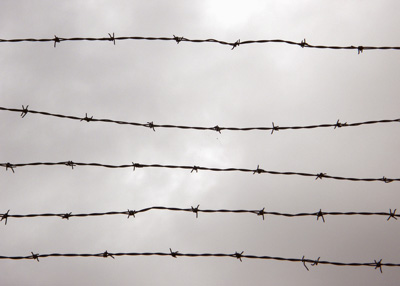 I believe through any trial,
I believe through any trial,
is always a way
But sometimes in this suffering
and hopeless despair
My heart cries for shelter,
to know someone’s there
But a voice rises within me,
saying hold on my child, I’ll give you strength,
I’ll give you hope. Just stay a little while.
I believe in the sun even when it is not shining
And I believe in love even when there’s no one there
But I believe in God even when he is silent
I believe through any trial there is always a way.
May there someday be sunshine
May there someday be happiness
May there someday be love
May there someday be peace….”
~ Words scratched on the walls of a cellar in Cologne, Germany by a Jew (Anonymous) hiding from Nazi persecution.
June 10, 2012
The Solemnity of the Most Holy Body & Blood of Christ: Year B
Exodus 24:3-8
Psalm 116:12-13, 15-16, 17-18
Hebrews 9:11-15
Mark 14:12-16, 22-26
Priceless Treasure
(Mark 14:12-16, 22-26)
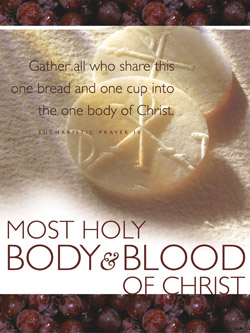 The Solemnity of the Most Holy Body & Blood of Christ which we celebrate today, teaches all Catholics throughout the world about the centrality of the Eucharist. Through the gift of the Eucharist we are brought to the edge of eternity where the risen Christ is present to His Church. As we invoke the Holy Spirit to come down upon the gifts of bread and wine, we become aware of a love beyond all telling. We recall the words of the Last Supper and the Sacrifice that took place on Calvary as we offer the unbloodied sacrifice at the altar of God. There are some Christian communities who simply have communion services, emphasizing their communion with one another rather than divine interaction. Others say the bread and wine are merely symbols, not the body and blood of Christ. Catholicism teaches the doctrine of transubstantiation – that is, the bread and wine actually become the body and blood of Jesus.
The Solemnity of the Most Holy Body & Blood of Christ which we celebrate today, teaches all Catholics throughout the world about the centrality of the Eucharist. Through the gift of the Eucharist we are brought to the edge of eternity where the risen Christ is present to His Church. As we invoke the Holy Spirit to come down upon the gifts of bread and wine, we become aware of a love beyond all telling. We recall the words of the Last Supper and the Sacrifice that took place on Calvary as we offer the unbloodied sacrifice at the altar of God. There are some Christian communities who simply have communion services, emphasizing their communion with one another rather than divine interaction. Others say the bread and wine are merely symbols, not the body and blood of Christ. Catholicism teaches the doctrine of transubstantiation – that is, the bread and wine actually become the body and blood of Jesus.
In Lumen Gentium (Dogmatic Constitution of the Church) paragraph 11, we are told, “Taking part in the Eucharistic sacrifice, the source and summit of the Christian life, they offer the divine victim to God and themselves along with it.” In the breaking of the bread, Christ becomes available to each one of us in a very tangible way. Jesus’ life is broken for us, so that in the midst of our fragile lives we can appreciate that God understands. Each one of us through weakness admits that we are not worthy. On the other hand the words of the gospel give each of us the dignity of being called a son or daughter of God, making us completely worthy!
Through the gift of the real presence we are given a priceless treasure that is heaven’s treasure. To the nonbeliever, the simple gifts presented to the altar remain just as bread and wine. However, people who have faith realize that the food and cup offered at the altar enable them to be fed and nourished, not only in the present moment, but for all eternity. At the moment of Holy Communion, Jesus Christ offers his body and blood as the life force for the Christian community. The Mass is the Sacred Meal in which we are fed by the Word and nourished by the Sacrament. It is also a moment that becomes timeless in which we relive the events that give us salvation in Christ. The once and for all sacrifice of Calvary is relived again and again, reminding us of the great sacrifice that will lead us to eternal life. As we come to the conclusion of the Mass the minister sends us forth to encounter the Christ in the gift of another.
Prayer
We pray: Jesus, may we hunger for you as the Bread of Life. Help us to drink from the Cup of Life, knowing that you are constantly present to us. Whenever we gather to celebrate the Mass, we hope that we become aware of the holy ground on which we stand. Let us always uphold the dignity of all those who gather to celebrate the Eucharist no matter how perfect or imperfect they may be. May the wisdom of your love make us increasingly aware of the priceless treasure that is given in the Mass. Amen.
Reflection Questions
- In what ways is the Catholic tradition different to Protestantism in regard to the teaching on the Eucharist?
- How does your faith in the real presence comfort you?
- Do you allow Jesus to feed your soul or do you allow other things to satisfy you?
- In return for Jesus offering himself to you, how do you offer yourself to God?
- Name the practical ways in which you can enter into communion with God.
- In regard to consuming the body of Christ, how in turn will you become Christ to others?
Wisdom of the Fathers
“The Church draws her life from the Eucharist. This truth does not simply express a daily experience of faith, but recapitulates the heart of the mystery of the Church. In a variety of ways she joyfully experiences the constant fulfillment of the promise: “Lo, I am with you always, to the close of the age” (Mt 28:20), but in the Holy Eucharist, through the changing of bread and wine into the body and blood of the Lord, she rejoices in this presence with unique intensity. Ever since Pentecost, when the Church, the People of the New Covenant, began her pilgrim journey towards her heavenly homeland, the Divine Sacrament has continued to mark the passing of her days, filling them with confident hope.
The Second Vatican Council rightly proclaimed that the Eucharistic sacrifice is “the source and summit of the Christian life”. “For the most holy Eucharist contains the Church’s entire spiritual wealth: Christ himself, our Passover and Living Bread. Through his own flesh, now made living and life-giving by the Holy Spirit, he offers life to men”. Consequently, the gaze of the Church is constantly turned to her Lord, present in the Sacrament of the Altar, in which she discovers the full manifestation of his boundless love.”
~ ECCLESIA DE EUCHARISTIA: Blessed John Paul II (2003)
June 03, 2012
The Solemnity of the Most Holy Trinity: Year B
Deuteronomy 4:32-34, 39-40
Psalm 33:4-5, 6, 9, 18-19, 20, 22
Romans 8:14-17
Matthew 28:16-20
A Boundless Love
(Matthew 28:16-20)
The discerning student of the Sacred Scriptures realizes that divine revelation contained within the biblical texts is all about the right relationship. From the beginning of time until present day, God has continually revealed himself to the world and invites us into a relationship with Him. The model of the right relationship that God gives us is to be found in the Trinity. As we celebrate the Solemnity of the Most Holy Trinity, we are reminded of the boundless generosity of God. God is to be found in the gift of Creation. The Father makes himself known to humanity and desires to enter into covenant with us. As humanity strived to know God, sin entered into the equation and broke the covenant. Man’s inhumanity to man separated him from God. The Father in heaven does not give up on His desire for the relationship and so gives of Himself by offering us the Son. Jesus restores this lost innocence by sacrificing himself for our sins and gives us an everlasting covenant in his blood. When Jesus returns to the kingdom from which he came, he bestows the gift of the Holy Spirit upon the Church, to continue his saving work.
The generous self-giving nature of God is still with us today. Every time we gather for worship, we acknowledge our belief in three divine persons, but one God, as we begin in the name of the Father, and of the Son, and of the Holy Spirit. Each person of the Trinity enables us to explore and appreciate the dimensions of God’s unfailing love. While the Trinity remains a mystery, God’s presence is not hidden from us. God continues to touch us on various levels. At baptism we are baptized in the name of the Father, and of the Son, and of the Holy Spirit. Jesus in the great commissioning of Matthew’s gospel gives the disciples the task of making his presence known through their teaching. One of those ways is by immersing people into the waters of baptism and into the divine life of God. Christ’s message is still proclaimed. Christ’s commandment of love continues to challenge all of us when we are faced with different situations. We are reminded through the proclamation of the gospel that one day we will stand before the Father in heaven to give a full account of life. The Holy Spirit continues to inspire us and to solidify Christ’s presence through the gift of the Eucharist and through the Mystical Body of Christ.
The Most Holy Trinity teaches us how we can give of ourselves. God’s love for us knows no bounds. Likewise, our love for God should know no bounds ~ neither should our love for one another. The nature of the Trinity is a positive encouragement for those who are married. Each person of the Trinity complements the other. The function of each person of the Trinity is different, yet points to the same nature of God. In marriage, couples are called to become one and complement one another through the gift they have to offer. People who live in the single state or lead a life of ministry can also draw strength from the selfless giving nature of the Trinity. As we all strive to know God in our given vocation, let us remind ourselves that God is to be experienced in many varied ways!
Prayer
We pray: We praise and thank you, God our Father, Son, and Spirit, for all that you have given us. Inspire in us the spirit of generosity in which you make yourself manifest to the world. At the dawning of each new day may we learn to be generous to one another. Amen.
Reflection Questions
- How does the mystery of the Trinity inspire you?
- Do you truly accept God as Father?
- In what way does the sacrifice of God’s only Son inspire you to sacrifice for God?
- How does the Holy Spirit lead you into the mystery of God?
- Have you allowed yourself to enter into communion with God and others?
- Do your personal relationships reflect the nature of God’s generosity?
- How does the Blessed Trinity inspire you to live in harmony?
Wisdom of the Fathers
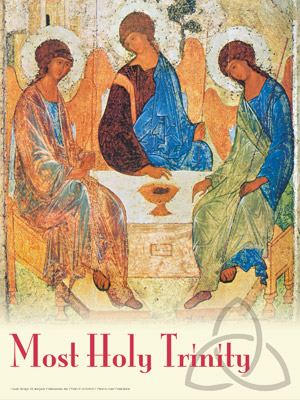 On this Sunday that follows Pentecost, we are celebrating the Solemnity of the Most Holy Trinity. Thanks to the Holy Spirit, who helps us understand Jesus’ words and guides us to the whole truth (cf. Jn 14: 26; 16: 13), believers can experience, so to speak, the intimacy of God himself, discovering that he is not infinite solitude but communion of light and love, life given and received in an eternal dialogue between the Father and the Son in the Holy Spirit – Lover, Loved and Love, to echo St Augustine… .
On this Sunday that follows Pentecost, we are celebrating the Solemnity of the Most Holy Trinity. Thanks to the Holy Spirit, who helps us understand Jesus’ words and guides us to the whole truth (cf. Jn 14: 26; 16: 13), believers can experience, so to speak, the intimacy of God himself, discovering that he is not infinite solitude but communion of light and love, life given and received in an eternal dialogue between the Father and the Son in the Holy Spirit – Lover, Loved and Love, to echo St Augustine… .
…Those who encounter Christ and enter into a friendly relationship with him welcome into their hearts Trinitarian Communion itself, in accordance with Jesus’ promise to his disciples: “If a man loves me, he will keep my word, and my Father will love him, and we will come to him and make our home with him” (Jn 14: 23)… .
…All beings are ordered to a dynamic harmony that we can similarly call “love”. But only in the human person, who is free and can reason, does this dynamism become spiritual, does it become responsible love, in response to God and to one’s neighbor through a sincere gift of self. It is in this love that human beings find their truth and happiness… .
…Among the different analogies of the ineffable mystery of the Triune God that believers are able to discern, I would like to cite that of the family. It is called to be a community of love and life where differences must contribute to forming a “parable of communion”.
~ Pope Benedict XVI (Angelus Address on the Feast of the Most Holy Trinity, 2006)
May 28, 2012
Pentecost Sunday: Year B
Acts 2:1-11
Psalm 104:1, 24, 29-30, 31, 34
1 Corinthians 12:3B-7, 12-13 or Galatians 5:16 -25
John 20:19 -23 or John 15:2627; 16:12-15
One Body, One Spirit in Christ
As we celebrate the Birthday of the Church at Pentecost, we acknowledge unity in the midst of great diversity. When we examine the long-standing history of the Church we acknowledge a religious experience that has seen many deaths and resurrections. Our ancestors created the ongoing saga of salvation history as they strived to pass on the faith in their own particular way. The Christian story encompasses the diversity of the past and the present, celebrating unity in the Spirit. This same Spirit, bestowed upon the apostles at Pentecost, continues to move and breathe in the Church as she journeys through time.
We are reminded in our readings today that even though we are many members, we are baptized into one body. In Eucharistic Prayer III, we pray that we become “…one Body, one Spirit in Christ.” Every individual in the Church has a particular role to play. There is vast experience present in the diversity of any congregation. As baptized Catholic Christians we share in the priestly and prophetic ministry of Jesus Christ. Each one of us is called to give witness to Christ in our own circumstance. The Spirit continues to inspire the Church to be the compassion of Christ in the world today. It is our duty to uphold the dignity and sanctity of life. We are obliged to respond to the world’s need by sharing the little we have with those who have none. In the gospel of John, Jesus is seen offering a peace that the world cannot give and imparts the gift of the Spirit to the disciples, giving them authority to continue his redemptive work. Likewise, this same Spirit is bestowed upon us to continue this journey into transformation.
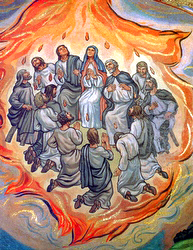 On the day of Pentecost the disciples had locked themselves away in fear. The Spirit filled their hearts and enabled them to speak in ways that they had never before. Their fears were cast aside. The disciples began to form a new community of faith – using boldness in a way they had never used it before. Jesus had filled them with the Father. The imparting of the Holy Spirit solidified Jesus’ wisdom in their hearts. These followers began to understand, depending on the counsel, fortitude, knowledge, piety, and the fear of the Lord that the Holy Spirit had given them on that first Pentecost. They went out in unity, making Jesus’ message known. Through their witness, they began to reshape the world around them creating a new civilization in which Christ would be the center.
On the day of Pentecost the disciples had locked themselves away in fear. The Spirit filled their hearts and enabled them to speak in ways that they had never before. Their fears were cast aside. The disciples began to form a new community of faith – using boldness in a way they had never used it before. Jesus had filled them with the Father. The imparting of the Holy Spirit solidified Jesus’ wisdom in their hearts. These followers began to understand, depending on the counsel, fortitude, knowledge, piety, and the fear of the Lord that the Holy Spirit had given them on that first Pentecost. They went out in unity, making Jesus’ message known. Through their witness, they began to reshape the world around them creating a new civilization in which Christ would be the center.
The Holy Spirit freely offers this fruit of courage to boldly give witness to our faith. Even though we approach the work of the Church in various ways, we are called to unity in the message of the gospel of love. Some may be conservative in their expression of faith, others liberal, while still others are moderate in their religious experience. It is important to remember that no matter where we find ourselves on the scale of discernment, we are called to unity in Christ. Each one of us is asked to be faithful to the teachings that enable us to be called Catholic Christians. All members of the Body of Christ are equal but have a particular role and service to offer. Everyone in the Church contributes to building the kingdom of God. We are asked to seek together, the gifts of wisdom, understanding, counsel, fortitude, knowledge, piety and fear of the Lord. As we search for these gifts, the presence of God will be evident in what we do and say. It is then that we begin to reshape the world around us that often stands in opposition to the will of God and create, in the words of Paul VI, “a civilization of love and peace”.
Prayer
We pray: Holy Spirit of life, inspire and move us to create a kingdom of justice, love and peace. May we never allow ourselves to be an obstacle to your message of unfailing love. Enable us to appreciate the vast experience of the Mystical Body and embrace the gift of diversity. We also pray that we will use wisely these gifts so that others may be brought to knowledge and love of You, our God. Let the courage of the Holy Spirit lead and guide us until the end of time. Amen.
Reflection Questions
Reflecting on the Seven Gifts of the Holy Spirit, contemplate the following questions:
- How do I use the wisdom of God when making choices?
- Am I in touch with the voice of the Holy Spirit with me in order to understand God’s will and my purpose?
- Whose counsel do I consider: God’s or the worlds?
- Do I accept the gift of fortitude in order to be courageous in giving witness to my faith’s values?
- How do I accept the knowledge gifted by the Holy Spirit to enable me to discover what God wants from me?
- Do I cherish the gift of piety in which I show God love and reverence?
- Have I an adequate fear of hurting the Lord by offending him through my actions?
Wisdom of the Fathers
“Although to some it may seem strange
Pentecost is an event that also involves the secular world.
For it gave rise to a new sociology —
one which penetrates the values of the spirit,
which forms our hierarchy of values,
and which confronts us with the truth,
and with the ultimate destiny of humanity.
It is this which has given us our belief
in the dignity of the human person,
and our civil customs,
and which above all leads us to resolutely rise above
all divisions and conflicts between humans,
and to form humanity into a single family of the children of God,
free and fraternal.
We recall the symbolism
at the beginning of this amazing story,
of the miracle of many different languages
being made comprehensible to everyone by the Spirit.
It is the civilization of love and of peace
which Pentecost has inaugurated —
and we are all aware how much today
the world still needs love and peace!”
~ Pope Paul VI’s Regina Coeli Address On Pentecost Sunday (May 17th, 1970)
May 20, 2012
The Solemnity of the Ascension of the Lord: Year B
Acts 1:1-11
Psalm 47:2-3, 6-7, 8-9
Ephesians 1:17-23 or Ephesians 4:1-13
Mark 16:15-20
A Broken Promise or A Dream Fulfilled?
The event of the Ascension of the Lord must have been filled with tremendous emotions. The early disciples had witnessed the risen Lord Jesus with their very eyes. Even though many had failed to stand by him at the cross, his risen presence among them restored what had been broken. These disciples must have been overwhelmed with joy at seeing Jesus in his risen state. It becomes very close from the post resurrection experiences that Jesus is fulfilling the prophecy of the scriptures. After his public ministry is transformed through his death and resurrection, Jesus commissions his followers to carry on the redemptive and salvific work that had begun. In today’s gospel the disciples are told to go into the whole world, proclaim the gospel, and to bring others to salvation through baptism.
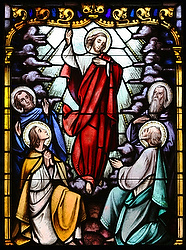 When Jesus commissions the disciples with this ongoing mission, he is taken up into heaven. One could wonder how the disciples must have felt. They had seen with their very eyes the promise of God had been realized. However, did this mean that this promise disappeared when Jesus was taken away once again? Their grief must have been significant. As we continue on the story we realize that the dream of God to bring humanity to salvation continues through the work of the early disciples. The preaching of the gospel continued, accompanied by signs and miracles. Even though Jesus was taken away bodily, he remained with the disciples spiritually to continue the work he had begun.
When Jesus commissions the disciples with this ongoing mission, he is taken up into heaven. One could wonder how the disciples must have felt. They had seen with their very eyes the promise of God had been realized. However, did this mean that this promise disappeared when Jesus was taken away once again? Their grief must have been significant. As we continue on the story we realize that the dream of God to bring humanity to salvation continues through the work of the early disciples. The preaching of the gospel continued, accompanied by signs and miracles. Even though Jesus was taken away bodily, he remained with the disciples spiritually to continue the work he had begun.
The Ascension of the Lord is very significant for the Church today. The coming of Christ did not mark an end to the world but a beginning of goodness. Jesus continues to commission us to preach the gospel and make evident his presence in the world today. Jesus is now seated at the right hand of the Father waiting for us when we reach our journey’s end. Do we live in this expectation? To believe in Jesus Christ and the good news he proclaimed is not just a cognitive process, it is a way of life. The ministry of Jesus taught the world to embrace the reality of unconditional love. Jesus’ teaching and example shows how we can redeem our lives by living in right relationship with ourselves, others and God. It is the choices that we make today that bring us to the promise of tomorrow. Christ shows us how God’s dream for humanity is to live holy and sinless lives. Holiness brings us to the threshold of eternal life and to where Christ is seated. The holiness to which we are called is not to be confused with pious or religious practices. Such practices should be symptomatic of the lives that we lead. Holiness comes from loving the Lord our God with our minds, hearts, soul and strength, and loving our neighbors with the selfless love that Christ engaged himself in. It is such love and commitment that inherits for us eternal life. Jesus continues to be with us on our journey of faith and in our experience of Church. Jesus’ presence is made known in our tangible acts of kindness and charity. Jesus is present when we gather in his name and act of our love. Jesus is our spiritual companion on life’s journey!
Prayer
We pray: Lord Jesus, send us your Spirit to encourage us in our faith. May we recognize that even though you are seated at the right hand of the Father, you are still with us. Help us to reverence your presence in the Eucharist by listening faithfully to your Word and in the breaking of the bread. Let us also reverence you by respecting the dignity of one another. Whenever our journey reaches its end, may we come to your throne and return the gift of our lives well lived. Amen.
Reflection Questions
- How does the Ascension of Jesus offer you hope?
- What did Jesus commission his disciples to do?
- Do you accept the commission to take the gospel into the world?
- What are some of the challenges you encounter in trying to proclaim the gospel message?
- How does the gospel message enlighten your mind?
- In what ways do you allow the message of Jesus to shape your consciousness politically and socially?
- How does the wisdom of Jesus Christ transform your relationships?
- Where do you encounter Christ in your life?
- Do you spend enough time in prayer discerning God’s will for you?
Wisdom of the Fathers
“Today our Lord Jesus Christ ascended into heaven; let our hearts ascend with him… For just as he remained with us even after his ascension, so we too are already in heaven with him, even though what is promised us has not yet been fulfilled in our bodies…
Why do we on earth not strive to find rest with him in heaven even now, through the faith, hope and love that unite us to him? While in heaven he is also with us; and we while on earth are with him. He is here with us by his divinity, his power and his love. We cannot be in heaven, as he is on earth, by divinity, but in him, we can be there by love.
He did not leave heaven when he came down to us; nor did he withdraw from us when he went up again into heaven. The fact that he was in heaven, even while he was on earth, is borne out by his own statement: No one has ever ascended into heaven except the one who descended from heaven, the Son of Man, who is in heaven.
Out of compassion for us he descended from heaven, and although he ascended alone, we also ascend, because we are in him by grace. Thus, no one but Christ descended and no one but Christ ascended; not because there is no distinction between the head and the body, but because the body as a unity cannot be separated from the head.”
~ St. Augustine of Hippo (354-430 AD): Homily on Ascension
May 13, 2012
Sixth Sunday of Easter: Year B
Acts 10:25-26, 34-35, 44-48
Psalm 98:1, 2-3, 3-4
1 John 4:7-10
John 15:9-17
The Seamless Garment of Love
The subject of love has occupied the minds of humanity for thousands of years. From our ancestors of faith who put their complete trust in God and who loved Him with all their hearts, souls and minds, to this very day, there has been a preoccupation with the spectrum of love. Philosophers and theologians continue to grapple with this mystery, struggling to name the experience. It should be no surprise to us that our leader, Pope Benedict XVI, gifts the Church with his first encyclical, “Deus Caritas Est” (“God is Love”). There are many ways in which we can love. There are four words in the Greek that describe love. “Eros” speaks of love as passion or eroticism. “Philia” is the love of friendship or familial love. “Sturge” is the love of things or affection. “Agape” denotes charity, unconditional love, or most importantly, selfless love.
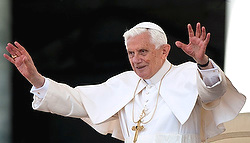 Today’s scriptures focus on “agape”. The love that God has bestowed upon humanity is selfless love. God loved us enough to create us in His own image and likeness. He gave his only Son so that we may not die, but have eternal life. In return, we are invited to participate in this divine selfless love that has been demonstrated to us. In today’s gospel, Jesus’ commandment is to love one another how he has loved us. How did Jesus love? Jesus’ love was unconditional and selfless from the beginning of his public ministry to the very point of surrendering to the cross. Jesus unconditionally loves the sinner and empowers the sinner to begin again, restoring confidence within themselves. When Jesus reaches out to the outcast and the disturbed, he risks opposition and humiliation from his fellow Jews. However, Jesus’ love for such people transcends his own needs in order to restore the outcast’s rightful place within society. Jesus bridges the gap between heaven and earth. Through the covenant in his blood he heals the broken promises of humanity and the covenants that humanity has failed to keep. The blood of the cross and the glory of the resurrection opens wide the gate to everlasting life.
Today’s scriptures focus on “agape”. The love that God has bestowed upon humanity is selfless love. God loved us enough to create us in His own image and likeness. He gave his only Son so that we may not die, but have eternal life. In return, we are invited to participate in this divine selfless love that has been demonstrated to us. In today’s gospel, Jesus’ commandment is to love one another how he has loved us. How did Jesus love? Jesus’ love was unconditional and selfless from the beginning of his public ministry to the very point of surrendering to the cross. Jesus unconditionally loves the sinner and empowers the sinner to begin again, restoring confidence within themselves. When Jesus reaches out to the outcast and the disturbed, he risks opposition and humiliation from his fellow Jews. However, Jesus’ love for such people transcends his own needs in order to restore the outcast’s rightful place within society. Jesus bridges the gap between heaven and earth. Through the covenant in his blood he heals the broken promises of humanity and the covenants that humanity has failed to keep. The blood of the cross and the glory of the resurrection opens wide the gate to everlasting life.
Since Jesus has invited us to keep his commandment to love one another as he has loved us, we ought to discern what this means in the present day. If we engage ourselves in selfless love, we will embark on the journey of transformation. When we love our neighbor and the stranger with selfless love we clothe ourselves with Christ’s seamless garment of compassion. Once we live this way, our love will define who we are and God will be forever present with us. In concrete, the present day conflicts and debates that are constantly bombarding the T.V. screens, will call for a Christian response. It is here that our faith must dialogue with our culture. To simply put it, it is in this place where Christ needs to be experienced through our attitudes and efforts for peace and justice.
Prayer
We pray: Dear Lord, wherever charity and love is to be found, you are there. Help us to become true disciples who are able to embrace unconditional and selfless love. Conflict and division still tear away at the seamless garment of your love and compassion. Give us the courage to be agents of change and to embrace your great commandment of love. Amen.
Reflection Questions
- What are the different expressions of love in your life?
- How does your love of God differ from other types of love?
- What does unconditional love mean for you?
- In what ways is Jesus challenging you to offer love unconditionally?
- How does this unconditional gift of love shape your world view and the choices you make each week?
- What brings you joy?
- How will your joy be complete?
Wisdom of the Fathers
“Love of neighbor is thus shown to be possible in the way proclaimed by the Bible, by Jesus. It consists in the very fact that, in God and with God, I love even the person whom I do not like or even know. This can only take place on the basis of an intimate encounter with God, an encounter which has become a communion of will, even affecting my feelings. Then I learn to look on this other person not simply with my eyes and my feelings, but from the perspective of Jesus Christ. His friend is my friend. Going beyond exterior appearances, I perceive in others an interior desire for a sign of love, of concern. This I can offer them not only through the organizations intended for such purposes, accepting it perhaps as a political necessity. Seeing with the eyes of Christ, I can give to others much more than their outward necessities; I can give them the look of love which they crave. Here we see the necessary interplay between love of God and love of neighbor which the First Letter of John speaks of with such insistence. If I have no contact whatsoever with God in my life, then I cannot see in the other anything more than the other, and I am incapable of seeing in him the image of God. But if in my life I fail completely to heed others, solely out of a desire to be “devout” and to perform my “religious duties”, then my relationship with God will also grow arid. It becomes merely “proper”, but loveless. Only my readiness to encounter my neighbor and to show him love makes me sensitive to God as well. Only if I serve my neighbor can my eyes be opened to what God does for me and how much he loves me. The saints — consider the example of Blessed Teresa of Calcutta — constantly renewed their capacity for love of neighbor from their encounter with the Eucharistic Lord, and conversely this encounter acquired its realism and depth in their service to others. Love of God and love of neighbor are thus inseparable, they form a single commandment. But both live from the love of God who has loved us first. No longer is it a question, then, of a “commandment” imposed from without and calling for the impossible, but rather of a freely-bestowed experience of love from within, a love which by its very nature must then be shared with others. Love grows through love. Love is “divine” because it comes from God and unites us to God; through this unifying process it makes us a “we” which transcends our divisions and makes us one, until in the end God is “all in all” (1 Cor 15:28).”
~ Pope Benedict XVI
Encyclical Letter, Deus Caritas Est
May 06, 2012
Fifth Sunday of Easter: Year B
Acts 9:26-31
Psalm 22:26-27, 28, 30, 31-32
1 John 3:18-24
John 15:1-8
Growing In Christ
(John 15:1-8)
Many of the images that Jesus uses in the Sacred Scriptures can be lost for the listeners of modern day. Many cannot relate the rural background that provides the setting for Jesus’ teachings. The image of Jesus as the true vine is indeed a powerful one. A vine takes a lot of care and attention in order to reach its fullest potential. If a vine owner does not take care of the vine it will do one of two things, i.e. it will die or grow out of control, bearing no fruit at all. A good vine needs much attention. The vine grower has to be committed to enabling the vine to bear fruit. It is vital that parts of the vine be taken away so that it can reach its full potential of bearing fruit. A successful vine can be determined by the care and pruning that takes place each year.
Jesus tells us that he is the true vine. If we remain in his love and keep his commandments, we will produce the fruits of his love. We are part of the story that leads others to God. Jesus invites us to be part of his message by being part of his Church here on earth. Sometimes it is necessary to prune away the things that prevent us from reaching our full potential in our faith life. Once we commit ourselves to remaining close to Christ and his message, it is then we become his disciples and bear fruit. In order to become a disciple we must take as a model the person of Christ and fashion our lives around his message. The example of the gospel is the ultimate guide for the discerning Christian. Our sentiments can only be good if we consult the wisdom of Christ in our everyday concerns. Such wisdom helps us to peel around the layers of contradiction that obscure God’s vision for us and the world. We do this by simply turning away from the contradictions and constantly being open to conversion every day. If we place Christ as the source of our lives, we will grow in his wisdom and truth and reflect that to those around us.
Our Church, in her wisdom, fashions herself after Jesus Christ. Every time we gather to worship, we gather in the name of Christ himself and listen to his Word as if for the first time. The will of the Father and the healing of Christ can be discovered through the proclamation of the Word. As we gather around the altar, the priest reflects the action of the High Priest, that is, Christ himself, as he relives the last supper, Calvary and the resurrection. It is here that Christ nourishes us with his body and blood. The cup that we take comes forth from the vine itself that is ready to give us life, for the vine is Christ. We are a Eucharistic people. Even though there are many branches to the vine, there is only one vine and one grower. There are many people who make up the Church; each of us has a distinct part to play in the history of salvation. Even though there are many members, we pray that we become “One Body, one Spirit in Christ”. Together we bear the fruit that will last.
Prayer
We pray: Lord, you are the true vine, and we are the branches. As we journey through life, give us the power that comes forth from you, to transform and change us. Help us to be true disciples. Mold and fashion us with the message that you proclaimed two thousand years ago. May we prune the things that hinder us from your love and the right relationship with one another. Increase our faith and give us the resolve to be solely connected to you. Amen.
Reflection Questions
- How is Jesus as source of life for you?
- In what ways do you consult with the wisdom of Christ when faced with dilemmas in your life?
- What needs to be pruned out of your life in order that you reach your full potential?
- What does it mean to “remain in Jesus’” love?
- How do you bear the fruit of the gospel in your life?
- What do you think the important characteristics are of discipleship?
- What ultimately will bring you joy?
Wisdom of the Fathers
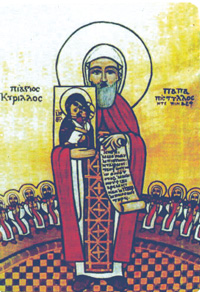 “From Christ and in Christ, we have been reborn through the Spirit in order to bear the fruit of life; not the fruit of our old, sinful life, but the fruit of a new life founded upon our faith in him and our love for him. Like branches growing from a vine, we now draw our life from Christ, and we cling to his holy commandment in order to preserve this life. Eager to safeguard the blessing of our noble birth, we are careful not to grieve the Holy Spirit who dwells in us, and who makes us aware of God’s presence in us.
“From Christ and in Christ, we have been reborn through the Spirit in order to bear the fruit of life; not the fruit of our old, sinful life, but the fruit of a new life founded upon our faith in him and our love for him. Like branches growing from a vine, we now draw our life from Christ, and we cling to his holy commandment in order to preserve this life. Eager to safeguard the blessing of our noble birth, we are careful not to grieve the Holy Spirit who dwells in us, and who makes us aware of God’s presence in us.
Let the wisdom of John teach us how we live in Christ and Christ lives in us: The proof that we are living in him and he is living in us is that he has given us a share in his Spirit. Just as the trunk of the vine gives its own natural properties to each of its branches, so, by bestowing on them the Holy Spirit, the Word of God, the only-begotten Son of the Father, gives Christians a certain kinship with himself and with God the Father because they have been united to him by faith and determination to do his will in all things. He helps them to grow in love and reverence for God and teaches them to discern right from wrong and to act with integrity.”
~ St. Cyril of Alexandria (376-444 AD)
Early Church Father and Doctor of the Church
April 29, 2012
Fourth Sunday of Easter: Year B
Acts 4:8-12
Psalm 118:1, 8-9, 21-23, 26, 28, 29
1 John 3:1-2
John 10:11-18
One Flock – One Shepherd
As we journey through the Season of Easter we hear various accounts of life for the post resurrection Christian in Acts of the Apostles. We are given an insight into how the early Church began to organize itself and hear about the bold witness of the apostles. In today’s first reading, Peter stands before the leaders of the people after healing a man. He points out fearlessly how the power of the Risen Christ had healed this man. Peter acclaims Jesus as the stone rejected by the builders, but the cornerstone of salvation. Peter puts his life on the line by confronting the leaders with the wisdom of the Shepherd. Peter knew what it meant to share in the work of the Shepherd. As a true Shepherd he was willing to lay down his life for the sheep, that is, for the people he was called to serve.
Today’s gospel speaks to the heart of God’s generosity. Jesus is the Good Shepherd who is willing to lay down his life for God’s people. He is not half committed, but wholly committed, to his mission and ministry. This is bore out upon Calvary, as he took upon our sins and that of the whole world. When Jesus spoke to his listeners, he was telling them that he was sent to lead them. His message is not to the people of Israel alone, but to the whole world. He tells us: “There will be one flock, one shepherd.” Jesus Christ’s mission is to gather us into the loving embrace of the Father and to guide us in the way of peace and truth. In this way, we can confidently say that we are children of God.
Jesus continues to guide the Church today. Sometimes personalities get in the way of the message, but overall, the Church stands the test of time. Christ is still the chief Shepherd of the Church. He continues to call us all by the virtue of our baptism, leading us to the Truth. The wisdom of Jesus Christ constantly directs us toward the right relationship with ourselves, others and God. The way of Christ in the gospel inspires us to transform what is broken and to seek out what is lost. If there are situations in our lives that do not embrace the reality of Jesus, then we have an opportunity to change that situation. Jesus Christ can accomplish his work in us if we allow his wisdom to penetrate our consciousness. Surrendering to the Truth of Christ in our experience allows us to enable Jesus to work through us. Just as Jesus is committed a hundred percent to the message he proclaimed, we too are called to the same commitment. Jesus also sends Shepherds our way through the gift of the priesthood to challenge, shape and renew the message of the gospel in the community. Together as priest and people, we are being led into the experience of God.
Prayer
We pray: Jesus, Good Shepherd, lead and guide us. May we surrender ourselves to the wisdom you have given to the world. We thank you for your sacrifice to save us from sin. We ask that you lead us through the trials of life as we seek to follow your will. Let us give witness to you in all that we do and say. As you send shepherds to lead your Church, may we recognize within them your handiwork and guidance. May we embrace your presence as you embrace each one of us in love. Amen.
Reflection Questions
- How does the image of Jesus as The Good Shepherd speak to you?
- In what ways do you listen to Jesus in your day to day experience?
- Do you allow yourself to listen to wisdom that contradicts the will of God?
- Name the ways in which you allow yourself to belong to God?
- How do you believe God cares for you?
- The wolf in the parable represents that which steals and kills the sheep – what would characterize ‘the wolf’ today?
- What are you willing to sacrifice for God knowing that Jesus laid down his life for you?
- In what ways are you participating in Jesus’ desire for unity in the world?
Wisdom of the Fathers
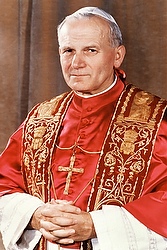 Jesus wants everyone to be a “good shepherd”.
Jesus wants everyone to be a “good shepherd”.
Every Christian, by virtue of Baptism, is called to be himself a “good shepherd” in the environment in which he lives. You parents must exercise the functions of the Good Shepherd with regard to your children; and you, too, children, must be edifying with your love, your obedience and, above all, with your courageous and consistent faith. Also the mutual relations between husband and wife must be marked by the example of the Good Shepherd, in order that family life may always have that nobility of sentiments and ideals willed by the Creator, because of which the family has been defined the “domestic Church”. So also at school, at work, in playgrounds and places of leisure, in hospitals and where people are suffering, let everyone always try to be a “good shepherd” like Jesus. But above all let persons consecrated to God, Religious, Sisters, those who belong to the Secular Institutes, be “good shepherds” in society. Today and always we must pray for all religious vocations, male and female, in order that this testimony of religious life in the Church may be more and more numerous, alive, intense and always efficacious. Today more than ever the world needs convinced witnesses who are completely consecrated!
~ Blessed John Paul II
April 22, 2012
Third Sunday of Easter: Year B
Acts 3:13-15, 17-19
Psalm 4:2, 4, 7-8, 9
1 John 2:1-5A
Luke 24:35-48
The Tangibility of Resurrection
(Luke 24:35-48)
Several years ago, there was a heated discussion among the Anglican communion about the bodily resurrection of Jesus. There were some who suggested that Jesus rose from the dead spiritually not physically, while most argued in the traditional and orthodox teaching of bodily resurrection. Sacred Scripture authenticates the reality of bodily resurrection. In today’s gospel, taken from Luke, the disciples think that they are encountering a ghost when they see Jesus. Christ himself points out that this is not the case. He reminds his followers that ghosts do not have flesh and bone. To prove the point, Jesus asks for something to eat and eats it in front of them.
Today’s gospel account is teaching us that resurrection is tangible. The resurrection is not a mere spiritual notion. Resurrection is real and transformative – it takes death and transforms it for all eternity. Jesus fulfills what was said of him in the Scriptures and opens the hearts of his post-resurrection listeners to the message of life. The risen Christ predicts and gives witness to what he had said about dying and rising on the third day. Jesus now reminds us that his mission of repentance, for the forgiveness of sins, has already begun in Jerusalem and must now be proclaimed to the ends of the earth. As Peter reminded the people, “The author of life you put to death, but God raised him from the dead; of this we are witnesses….Repent, therefore, and be converted, that your sins may be wiped away.” He is obviously reminding us that we must respond to the gift of the resurrection by taking action and changing our hearts because of this mystery revealed.
Jesus did not rise again just to prove that what he said would come to pass. The resurrection of Jesus is the crowning of his life that paves our way to salvation. Jesus reveals the resurrection so that we may continue his redemptive work here on earth. What is that redemptive work? It is a journey into transformation, using Jesus as the guide and the shepherd in this transforming work in progress. The message of the gospel is clearly given credence in Jesus rising from the dead. His message for repentance continues as the Church journeys through time. The call to conversion still remains. The wisdom and healing of Christ still needs to be proclaimed, so that all may know the saving power of Jesus Christ in their lives. The resurrection is tangible for us in the way that we encounter the real presence of Jesus in the Eucharist. It is at the altar that we take, bless and break the body of Christ, for all who gather in His name. At the moment of Holy Communion, we tangibly accept the gift of Christ who continues to offer us his body and blood. The tangibility of the resurrected Christ is discovered among the poor, the sinner, the outcast and the forgotten, in the vast wastelands of humanity that await transformation and attention. Once we respond to the need, the resurrected Christ is plainly seen in the Mystical Body of Christ – that is, in each one of us responding to the needs of the world.
Prayer
We pray: Help us to see clearly the vision that you have set before us. May we touch the reality of the resurrection among those we reach out to in love. Let our minds and hearts be open to signs of your resurrection among us. Increase our strength to do your will, bringing others to your wisdom and to the gift of repentance. We ask this through you, the Christ, the Risen Lord. Amen.
Reflection Questions
- Why were the disciples terrified when encountering Jesus?
- How does Jesus reassure his followers?
- How is the resurrection a tangible gift for you personally?
- How can you be a witness to the presence of the Risen Christ in your life?
- In what ways can you offer Christ’s peace to your relationships/the world?
- Where do you see God’s promise in your life right now?
- How will your future be shaped by the promise give to you?
Wisdom of the Fathers
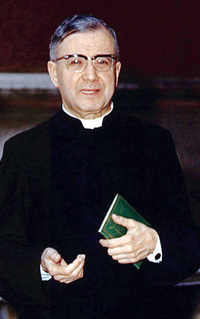 “Easter is a time of joy — a joy not confined to this period of the liturgical year, but to be found really and fully in the Christian’s heart. For Christ is alive. He is not someone who has gone, someone who existed for a time and then passed on, leaving us a wonderful example and a great memory.
“Easter is a time of joy — a joy not confined to this period of the liturgical year, but to be found really and fully in the Christian’s heart. For Christ is alive. He is not someone who has gone, someone who existed for a time and then passed on, leaving us a wonderful example and a great memory.
No, Christ is alive. Jesus is the Emmanuel: God with us. His resurrection shows us that God does not abandon his own. He promised he would not: “Can a woman forget her baby that is still unweaned, pity no longer the son she bore in her womb? Even these may forget, yet I will not forget you.” And he has kept his promise. His delight is still to be with the sons of men.
Christ is alive in his Church. “I tell you the truth: it is to your advantage that I go away, for if I do not go away, the Counselor will not come to you; but if I go, I will send him to you.” That was what God planned: Jesus, dying on the cross, gave us the Spirit of truth and life. Christ stays in his Church, its sacraments, its liturgy, its preaching — in all that it does.
In a special way Christ stays with us in the daily offering of the holy Eucharist. That is why the Mass is the center and source of Christian life. In each and every Mass the complete Christ, head and body, is present. Per Ipsum et cum Ipso et in Ipso. For Christ is the way; he is the mediator; in him we find everything. Outside of him our life is empty.”
~ “Christ is passing by” St. Josemaria Escriva (1902-1975)
April 15, 2012
Second Sunday of Easter: Year B
Acts 4:32-35
Psalm 118:2-4, 13-15, 22-24
1John 5:1-6
John 20:19-31
Unlocking the Doors of Fear
(John 20:19-31)
It is hard to imagine what must have been going through the disciples’ minds after the death of Jesus and the discovery of the empty tomb. All we know is that the disciples had returned to a house after they witnessed the empty tomb and locked the doors. Their fear was legitimate. Any association with Jesus could have brought destruction upon themselves. To fear for one’s life is a powerful and crippling emotion. The followers of Christ were trapped and uncertain about what the future held for them. In the midst of this, Jesus becomes present to them and offers his gift of peace. Jesus words, “Peace be with you,” spoke to their fears and offered them hope. At last they knew that Jesus’ words had been fulfilled and their leaving everything to follow him was not in vain. As he showed them his hands and his side, they must have been overwhelmingly aware that they were part of a divine drama that was continually unfolding. Jesus carries the authority to forgive sins along with his great imparting of peace. Thomas, the practical man, cannot believe without seeing this reality for himself. He sees a week later and believes as he affirms, “My Lord and my God!”
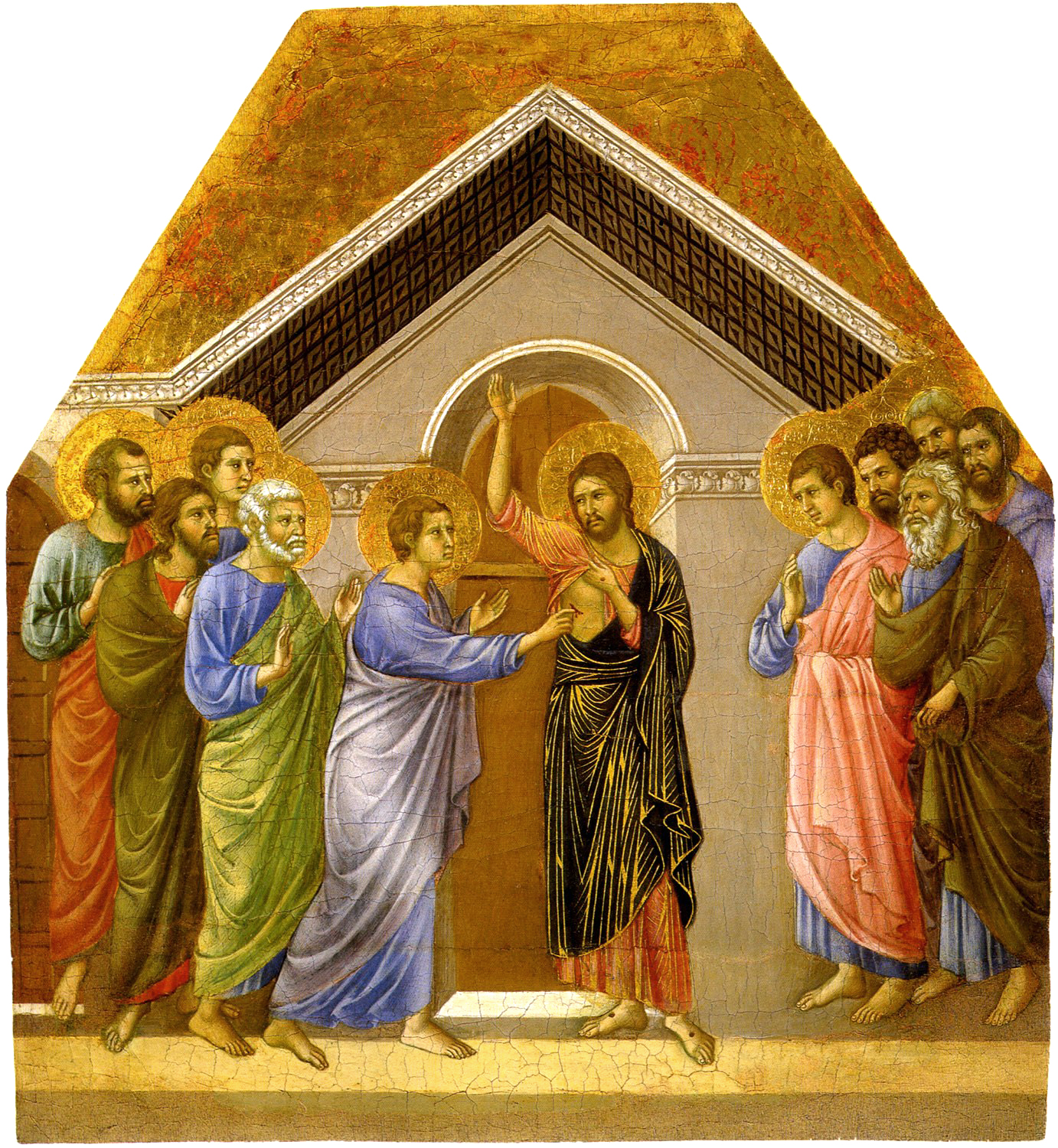 When Christ appeared after his resurrection, he appeared as a wounded healer. He unlocks the doors of fear and disbelief in the fragile faith of his disciples. Those men and women were blessed to catch a glimpse of the wounds that carried with them salvation. Those wounds bore witness to the sin of the world – they also revealed God’s glory and our hope. After Jesus’ death comes resurrection and the ongoing reality of his presence as he imparts authority upon the disciples. We might well say that the early witnesses of the resurrection certainly had it easy. Afterall, they had seen the realities of the resurrection with their very eyes. For them, especially Thomas, belief flowed from their eyewitness account. However, the reality was that their lives did not become easy after they had witnessed resurrection. The early Church experienced fear when Jesus ascended to the Father and when the Church became persecuted. To be a follower of Christ meant the disciple had to confront the fear of being rejected. Their proclamation of the risen Christ ultimately led them to imprisonment and death. Such martyrdom became, as the early Church father, Tertullian, wrote, “The seed of the Church.”
When Christ appeared after his resurrection, he appeared as a wounded healer. He unlocks the doors of fear and disbelief in the fragile faith of his disciples. Those men and women were blessed to catch a glimpse of the wounds that carried with them salvation. Those wounds bore witness to the sin of the world – they also revealed God’s glory and our hope. After Jesus’ death comes resurrection and the ongoing reality of his presence as he imparts authority upon the disciples. We might well say that the early witnesses of the resurrection certainly had it easy. Afterall, they had seen the realities of the resurrection with their very eyes. For them, especially Thomas, belief flowed from their eyewitness account. However, the reality was that their lives did not become easy after they had witnessed resurrection. The early Church experienced fear when Jesus ascended to the Father and when the Church became persecuted. To be a follower of Christ meant the disciple had to confront the fear of being rejected. Their proclamation of the risen Christ ultimately led them to imprisonment and death. Such martyrdom became, as the early Church father, Tertullian, wrote, “The seed of the Church.”
Jesus affirms the future generation of disciples by saying: “Blessed are those who have not seen and have believed.” The very fact that we believe today is a divine blessing. Sometimes it is hard to believe when we experience the pain of separation and loss. It takes a great leap of faith to have belief when we cannot see the reality of resurrection with the naked eye. However, it is within the gift of faith that we find true peace – a peace that the world cannot give. The only way that we can experience peace after we lose someone we love is by having the hope and security that God offers in the gift of resurrection and eternal life. Our faith enables us to face our fears and know that no matter what, God continues to journey with us.
Prayer
We pray: Risen Lord, help us see beyond your wounds and the wounds of the world. Encourage us to have faith and courage when we experience uncertainty and doubt. Unlock within us the doors that entrap us in fear and give us the peace that you alone can give. Amen.
Reflection Questions
- What motivated the disciples to lock themselves away after seeing the empty tomb?
- What does Jesus offer his disciples?
- How does Jesus respond to the doubts in the mind of Thomas?
- How does Thomas’ example speak to you?
- What are the fears in your life that hold you captive?
- Do you ever doubt God? If so, in what ways?
- Where do you need to experience Christ’s peace in your life right now?
Wisdom of the Fathers
Do not look forward in fear to the changes in life;
rather, look to them with full hope that as they arise,
God, whose very own you are,
will lead you safely through all things;
and when you cannot stand it,
God will carry you in His arms.
Do not fear what may happen tomorrow;
the same understanding Father who cares for
you today will take care of you then and every day.
He will either shield you from suffering
or will give you unfailing strength to bear it.
Be at peace,
and put aside all anxious thoughts and imaginations.
~ St. Francis De Sales (1567-1622)
April 8, 2012
Easter Sunday of the Resurrection of the Lord: Year B
Acts 10:34a, 37-43
Psalm 118:1-2, 16-17, 22-23
Colossians 3:1-4
or 1 Corinthians 5:6b-8
John 20:1-9
A Stone Rolled Away – Death Set Aside
When we visit a grave, we are confronted with the transience of life and we enter the realm of memory. It is there that we stop, mourn the loss and say a prayer in hopeful anticipation of the time yet to come for each one of us. In the Rite of Christian Burial, we pray, “The grave is a sign of hope that promises resurrection, even as it claims our mortal bodies.” For those who have no faith the grave represents a barren wasteland that surrenders itself to eternal death. However, for those of us who believe, it is a sure sign of metamorphosis and transformation. Our perspective of the grave radically changes because of what took place in a garden of rest two thousand years ago.
There is no way to know what was going through the mind of Mary of Magdala as she set out to pay her respects at the grave of Jesus. Every step that she took from her home to his tomb must have been haunted by what had gone on three days earlier. Her life had been transformed by the gentle mercy and healing of the one who embodied the compassion of God. Then she saw this man, this instrument of God, being insulted, tortured and killed before her eyes. Mary had heard Jesus talk about the rebuilding of the temple, but it probably did not resonate in her soul. On the first day of the week, this broken hearted woman set out to the tomb so she could grieve of the one who was so dear to her. She had surrendered to the painful reality that she had endured. However, when she arrived at the tomb, saw the stone removed, and noticed the burial cloths discarded, she entered yet again into the extraordinary life that Jesus had to offer. She ran back and reported what she had found; the disciples set out and when they had arrived, discovered the truth in what she had reported. The youngest one saw and believed that Jesus had been raised. The days that followed gave witness to that belief as Jesus appeared several times to his followers.
Jesus died and rose again to pave the way for our eternal salvation. The empty tomb fills us with the tremendous possibilities of everlasting life. Jesus shows us that death is not the end, but a new beginning. When we find ourselves at the funeral of a loved one and face the finality of the grave, we are to remember always the journey of Christ’s death and resurrection to assure us of the hope that is truly ours. The stone that was rolled away from the tomb represents Christ’s victory of death. It symbolizes the removal of death giving way to the newness of life.
As we celebrate this Easter day, let us give thanks to the Lord for the lives of all those who have gone before us. Let us let go of our fear of death and embrace the hope of resurrection. Each day for us is a step closer to the kingdom that awaits us and so we are to appreciate that the sacrament of the present moment ultimately leads us to this promise of life.
Prayer
We pray: Risen Lord, promise of what shall be, we praise you, and thanks for the blessings of the resurrection. As we journey through life, mold and fashion us in your love. Let every living and breathing moment of our lives bear witness to you. Give us the courage to face death with faith, and hope for the life to come. Amen.
Reflection Questions
- Why is the resurrection of Jesus important to you?
- How does the empty tomb transform the graves of those you have lost?
- How do you experience the presence of the Risen Lord in your everyday life?
- What is your ultimate destiny?
- What choices can you make to lead you to heaven?
- How does the promise of resurrection color your view on your own relationships?
- How does this promise help you build your relationship with God?
Wisdom of the Fathers
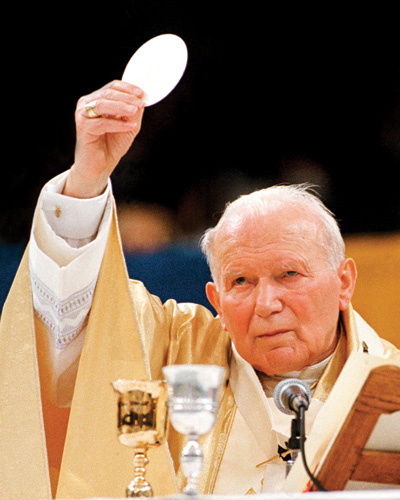 “The Word and the Bread of the Eucharist, the mystery and the gift of Easter, remain down the centuries as a constant memorial of the Passion, Death and Resurrection of Christ! On this Easter Day, together with all Christians throughout the world, we too repeat those words: Jesus, crucified and risen, stay with us! Stay with us, faithful friend and sure support for humanity on its journey through history! Living Word of the Father, give hope and trust to all who are searching for the true meaning of their lives. Bread of eternal life, nourish those who hunger for truth, freedom, justice and peace.
“The Word and the Bread of the Eucharist, the mystery and the gift of Easter, remain down the centuries as a constant memorial of the Passion, Death and Resurrection of Christ! On this Easter Day, together with all Christians throughout the world, we too repeat those words: Jesus, crucified and risen, stay with us! Stay with us, faithful friend and sure support for humanity on its journey through history! Living Word of the Father, give hope and trust to all who are searching for the true meaning of their lives. Bread of eternal life, nourish those who hunger for truth, freedom, justice and peace.
Stay with us, Living Word of the Father, and teach us words and deeds of peace: peace for our world consecrated by your blood and drenched in the blood of so many innocent victims: peace for the countries of the Middle East and Africa, where so much blood continues to be shed; peace for all of humanity, still threatened by fratricidal wars. Stay with us, Bread of eternal life, broken and distributed to those at table: give also to us the strength to show generous solidarity towards the multitudes who are even today suffering and dying from poverty and hunger, decimated by fatal epidemics or devastated by immense natural disasters.
By the power of your Resurrection, may they too become sharers in new life. We, the men and women of the third millennium, we too need you, Risen Lord! Stay with us now, and until the end of time. Grant that the material progress of peoples may never obscure the spiritual values which are the soul of their civilization. Sustain us, we pray, on our journey. In you do we believe, in you do we hope, for you alone have the words of eternal life (cf. Jn 6:68).
”
~ Blessed John Paul II, Easter Sunday 2005
April 1, 2012
Palm Sunday: Year B
Entrance Rite: Mark 11:1-10 or John 12:12-16
Isaiah 50:4-7
Psalm 22:8-9, 17-18, 19-20, 23-24
Philippians 2:6-11
Mark 14:1 – 15:47
Triumphal Entry to Suffering and Death
Today, in union with the Church throughout the world, we contemplate the triumphal entry of Jesus into Jerusalem and the events that led to his saving death. As the disciples of Jesus followed him into the holy city, they must have been amazed and awestruck at the welcome they witnessed. They probably thought that at last the world understood what they had come to believe — that Jesus is Messiah, for “Blessed is he who comes in the name of the Lord!” Jesus’ entry was an answer to prayer — the people waved their palm branches as if welcoming their new king. It is hard to believe that within one week this would all change. How could the crowd acclaim Jesus as Messiah on the Sunday and then shout for his death on that infamous Good Friday?
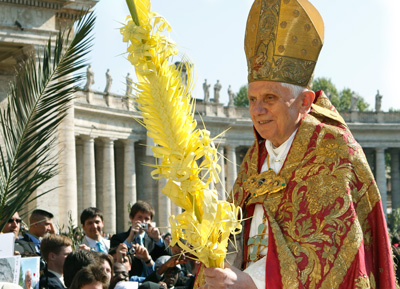 During Holy Week, we witness the high points and the low points of humanity. On Palm Sunday, the people who welcomed Jesus managed to go beneath the surface and connect with their deeper self. Their faith held out the hope that had arrived to transform them. As the week progressed, greed entered the heart of one man, Judas. In the upper room, as Jesus took the Unleavened Bread and the Cup, he held in his hands the new covenant in his blood. In the gesture of the washing of the feet, Jesus taught his disciples humility and service. In this selfless act, God himself stoops low to wash the feet of a sinful people whom he instructs to follow him in selfless acts of love. Jesus also embraced the fears of the disciples and the fragility of their discipleship. He told them, “Do not let your hearts be troubled; have faith in God, have faith also in me.” Jesus points out to his disciples that he was going to prepare the way for them, creating an eternal dwelling. After the meal, pride, arrogance and narrow-mindedness took hold of the religious leaders to the point of fanaticism, calling for Jesus’ death. These men believed themselves to be religious and holy, yet their instincts motivated them to incite the crowds against the Healing Christ. The insults, mockery and brutality inflicted upon Jesus demonstrated well how religious radicalism has deathly consequences.
During Holy Week, we witness the high points and the low points of humanity. On Palm Sunday, the people who welcomed Jesus managed to go beneath the surface and connect with their deeper self. Their faith held out the hope that had arrived to transform them. As the week progressed, greed entered the heart of one man, Judas. In the upper room, as Jesus took the Unleavened Bread and the Cup, he held in his hands the new covenant in his blood. In the gesture of the washing of the feet, Jesus taught his disciples humility and service. In this selfless act, God himself stoops low to wash the feet of a sinful people whom he instructs to follow him in selfless acts of love. Jesus also embraced the fears of the disciples and the fragility of their discipleship. He told them, “Do not let your hearts be troubled; have faith in God, have faith also in me.” Jesus points out to his disciples that he was going to prepare the way for them, creating an eternal dwelling. After the meal, pride, arrogance and narrow-mindedness took hold of the religious leaders to the point of fanaticism, calling for Jesus’ death. These men believed themselves to be religious and holy, yet their instincts motivated them to incite the crowds against the Healing Christ. The insults, mockery and brutality inflicted upon Jesus demonstrated well how religious radicalism has deathly consequences.
As we begin this Holy Week, we enter into a human story that has divine implications. Most of us will be able to identify with the motivations and emotions of each person involved in the great events of the week in which Jesus suffered and died. We are reminded this week that even though we may deny the Lord, fail to give witness, or show our full commitment to God, that the greatest of Saints have been there too. Just as the great Saints were called to transformation in the resurrection, where they renewed their commitment and gave witness to the death, so too are we called to that same transformation. This week calls to mind God’s sacrifice and commitment to us. God answered the prayers of those who longed for the Messiah to liberate them and save them. Our prayers are answered in the holy events of what took place centuries ago. As we journey through these days, let us show a similar commitment.
Prayer
We pray: Hosanna! Blessed is He who comes in the name of the Lord! We welcome you, Lord, into our lives. We are constantly blessed by your eternal presence. May we live the dream that you have for us. Let the prayers we make reflect your will, not ours. Help us to understand the nature of discipleship and give witness to you in all circumstances. Whenever we fail or lose sight of what is important, enable us to stand firmly on our feet and move forward in your ways. Lord Jesus, we thank you for your sacrifice, we acknowledge our sin, and give our lives completely to you. Amen
Reflection Questions
- How are you going to keep this week holy?
- In what ways do you honor Christ with your life?
- What is God calling you to sacrifice?
- How does Jesus’ example help you to deal with betrayal or denial?
- Which character(s) in the story of Holy Week can you empathize with?
- How have you used you faith in positive ways to build up others?
- In what ways has your faith helped you through the Calvaries of your life?
- What does the cross promise you?
Contemporary Wisdom
“The tragedy of the passion brings to fulfillment our own life and the whole of human history. We can’t let Holy Week be just a kind of commemoration. It means contemplating the mystery of Jesus Christ as something which continues to work in our souls. The Christian is obliged to be alter Christus, ipse Christus: another Christ, Christ himself.
Through baptism all of us have been made priests of our lives, “to offer spiritual sacrifices acceptable to God through Jesus Christ.” Everything we do can be an expression of our obedience to God’s will and so perpetuate the mission of the Godman.
Once we realize this, we are immediately reminded of our wretchedness and our personal failings. But they should not dishearten us; we should not become pessimistic and put our ideals aside. Our Lord is calling us, in our present state, to share his life and make an effort to be holy. Holiness can sound like an empty word. Too many people think it is unattainable, something to do with ascetical theology — but not a real goal for them, a living reality. The first Christians didn’t think that way. They often used the word “saints” to describe each other in a very natural manner: “greetings to all the saints”; “my greetings to every one of the saints in Jesus Christ.”
Take a look now at Calvary. Jesus has died and there is as yet no sign of his glorious triumph. It is a good time to examine how much we really want to live as Christians, to be holy. Here is our chance to react against our weaknesses with an act of faith. We can trust in God and resolve to put love into the things we do each day. The experience of sin should lead us to sorrow. We should make a more mature and deeper decision to be faithful and truly identify ourselves with Christ, persevering, no matter what it costs, in the priestly mission that he has given every single one of his disciples. That mission should spur us on to be the salt and light of the world.”
— St. Josemaria Escriva (1902 – 1975): Christ is Passing By
VIEW March 2012
VIEW February 2012
VIEW January 2012
VIEW 2011 Word & Life

